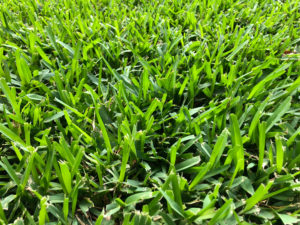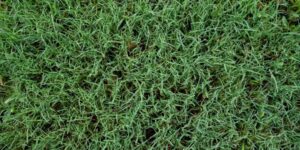When deciding between St. Augustine grass vs. Bermuda grass for your lawn in Houston, TX, it’s essential to consider how each type will impact the appearance and maintenance of your yard. Given the warm and humid climate of Houston, grass types generally require several hours of sunlight to thrive. If certain areas of your lawn do not receive enough sunlight—such as spots under large trees—you might consider installing a mulch bed or rock bed as a practical and visually appealing alternative.
For areas with sufficient sunlight, many homeowners are wondering which side they are on in the battle of St. Augustine grass vs. Bermuda grass. Each type has unique characteristics, benefits, and care requirements. Let’s explore the details to help you determine which grass is best suited for your yard.
St. Augustine Grass

St. Augustine grass is a popular choice in Houston, prized for its lush, broad blades and ability to thrive in warm, humid climates. It’s known for creating a thick, carpet-like appearance that’s both visually appealing and functional.
Pros:
-
Shade Tolerance: St. Augustine can grow in partial shade, making it ideal for yards with trees or other shaded areas.
-
Thick Growth: Its dense growth helps suppress weeds, reducing the need for frequent herbicide applications.
- Low Maintenance: Compared to Bermuda grass, it requires less frequent mowing, saving time and effort.
Cons:

-
Vulnerability to Diseases: St. Augustine grass is susceptible to fungal diseases like brown patch, particularly in moist conditions.
-
Thatch Build-Up: Over time, it may develop a thick thatch layer, which requires dethatching to maintain a healthy lawn.
-
Higher Water Needs: It demands consistent watering, especially during dry spells, to maintain its vibrant green appearance.
Care Tips for St. Augustine Grass:
- Mowing: Maintain a height of 3-4 inches for optimal health.
- Watering: Water deeply once or twice a week, depending on rainfall.
- Fertilization: Use a nitrogen-rich fertilizer during the growing season.
- Disease Prevention: Apply fungicides as needed and avoid overwatering to reduce fungal issues.
- For a more in-depth review of St. Augustine, visit our St. Augustine Grass Blog.
Is Bermuda Grass invading your St Augustine lawn? Read more about how to help your St Augustine in the battle between St. Augustine Grass vs. Bermuda Grass.
Bermuda Grass

Pros:
-
Drought Tolerance: Bermuda grass is more drought-resistant than St. Augustine, demanding less frequent watering.
-
Resilience: Its hardy nature makes it ideal for high-traffic areas such as playgrounds and sports fields.
-
Fast Growth: It establishes quickly and recovers rapidly from damage.
Cons:
-
Poor Shade Tolerance: Bermuda grass struggles in areas with limited sunlight, making it unsuitable for shaded yards.
-
Frequent Mowing: Its fast growth requires regular mowing to maintain a tidy appearance.
-
Aggressive Spread: Without proper management, Bermuda grass can invade flower beds and other areas of your yard.
Care Tips for Bermuda Grass:
- Mowing: Keep it trimmed to a height of 2-2.5 inches.
- Watering: Water every 5-7 days during dry periods, as it’s drought-tolerant but still needs hydration.
- Fertilization: Apply balanced fertilizers throughout the growing season for vigorous growth.
- Weed Control: Use pre-emergent herbicides to prevent weeds, as Bermuda’s fast spread can sometimes allow weeds to creep in.
- For a more in-depth review of Bermuda Grass, visit our Bermuda Grass Blog.
Is St. Augustine Grass invading your Bermuda lawn? Read more about how to help your Bermuda in the battle between St. Augustine Grass vs. Bermuda Grass.
Which Grass is Right for You?
When choosing between St. Augustine grass vs. Bermuda grass, consider these factors:
-
Sunlight: St. Augustine grass tolerates partial shade, while Bermuda grass thrives in full sun.
-
Traffic: Bermuda is more durable for high-use areas.
-
Water Needs: Bermuda grass is more drought-tolerant, requiring less frequent watering compared to St. Augustine.
-
Maintenance: St. Augustine grass needs less mowing, but Bermuda grass is hardier and recovers quickly from damage.
Learn more about the difference in care requirements for St. Augustine Grass vs. Bermuda Grass.
Both St. Augustine Grass vs. Bermuda Grass can create beautiful, vibrant lawns in Houston’s warm climate, provided your yard receives adequate sunlight. If your lawn struggles with shade or other environmental challenges, a mulch bed may offer a more practical and visually appealing solution for certain areas. At Greengate Turf & Pest, we specialize in helping homeowners achieve healthy, thriving lawns tailored to their specific needs. Contact us today for expert advice and customized lawn care solutions.







